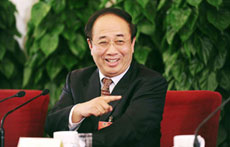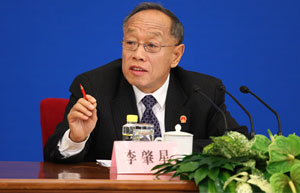Controversy ignites fiery debate
By Xin Dingding (China Daily)
Updated: 2011-03-11 08:52
Every March, deputies to the National People's Congress (NPC) and members of the Chinese People's Political Consultative Conference (CPPCC) submit suggestions on behalf of the people. And almost every year, some of them become red-hot Internet celebrities after their controversial suggestions ignite fiery debates.
| ||||
Two polemic proposals have been pushed to the frontline of public debate this year and have become hot-button issues among netizens.
The first is a proposal to require some TV channels, such as CCTV-1, the country's most-viewed channel, to refrain from airing commercials.
NPC deputy Fang Ming, who works for the national radio station, argued that many TV commercials feature "unhealthy" content, and some TV channels sacrifice ethics for profits. Banning commercials would improve the impartiality of their reports.
Fang cited the Chongqing satellite TV channel, which has scrapped ads, as a positive example that demonstrates the feasibility of the proposal.
When the media caught wind of the suggestion, Fang received passionate support and criticism.
People who approve of the proposal have said TV channels are reaping huge profits from a deluge of advertisements that has made watching these channels unbearable.
Opponents ask how the channels are supposed to survive without returning to the days when they received massive government subsidies or starting to charge viewers high fees.
Chongqing municipality has allocated 150 million yuan ($22.81 million) a year to compensate for the satellite TV channel's lost ad revenues.
The second contentious suggestion - offered by CPPCC member Wang Ping, who is also head of the China Ethnic Museum - has received scathing criticism from netizens.
Wang has said rural children should be discouraged from receiving higher education, because university graduates from the countryside will be unlikely to land jobs in the cities but also will not be willing to return to their hometowns.
The throngs of such students cram into small, crowded rented apartments, creating safety hazards and other headaches for city governments, she said.
Wang also said many rural families have fallen back into poverty by trying to pay for expensive tuitions.
Her ideas have typically met with fierce opposition in online discussions. The majority of Web posts defend rural students' rights to equal opportunities for higher education and the pursuit of better living conditions.
Many also questioned whether Wang has ever lived in rural areas and argue that if she had, she would know the shoddy rooms in cities are still far better than conditions in the countryside.
Most netizens point out the gap between the urban and rural living conditions is still huge enough to be chasmal, and discouraging rural children's university dreams is not the answer.
I believe these NPC deputies and CPPCC delegates are putting forth their suggestions with good intentions. But they apparently lack the ability to speak for the desires of the people.





